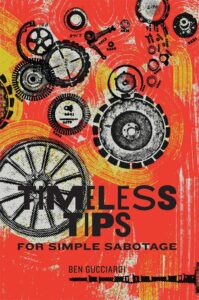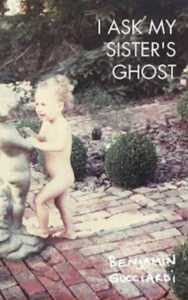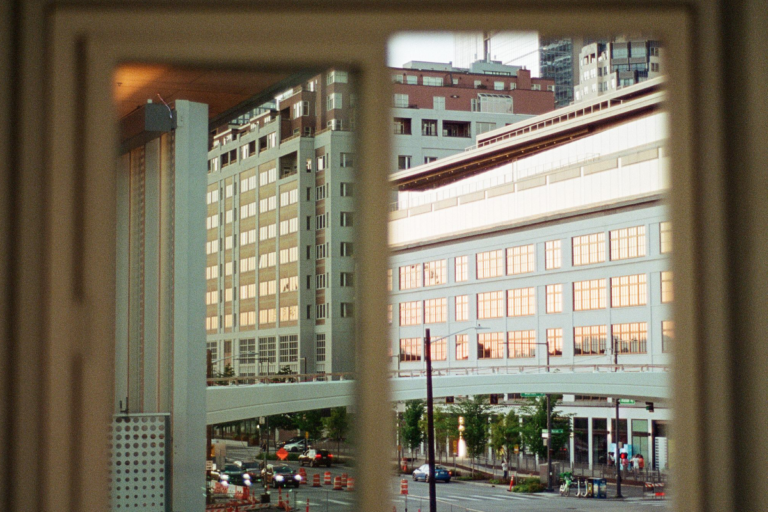Benjamin Gucciardi
The Rungs
A social worker holds a group for teenagers at a school. They only half pay attention to him. Then something happens, and they pay attention to each other.
We’re pleased to offer Benjamin Gucciardi’s poem, and invite you to connect with Poetry Unbound throughout this season.

Image by Annisa Hale/ Film processed by Moody's Film Lab, © All Rights Reserved.
Guest

Benjamin Gucciardi was born and raised in San Francisco, California. His first book, West Portal (University of Utah Press, 2021), was selected by Gabrielle Calvocoressi for the Agha Shahid Ali Prize in Poetry and was named a finalist for the Northern California Book Award and the Julie Suk Award. He is also the author of the chapbooks Timeless Tips for Simple Sabotage (Quarterly West, 2021), chosen by Elena Passarello as the winner of the 2020 Quarterly West Chapbook Contest, and I Ask My Sister’s Ghost (DIAGRAM/New Michigan Press, 2020). In addition to writing, he works with newcomer youth in Oakland, California through Soccer Without Borders, an organization he founded in 2006.
Transcript
Transcription by Alletta Cooper
[music: “Praise the Rain” by Gautam Srikishan]
Pádraig Ó Tuama: My name is Pádraig Ó Tuama, and I trained as a conflict mediator and kind of went into a speciality of group conflict, which is really a study about how groups talk to each other. You can go in if you’re the group leader and you have an idea, but you can’t control it. You’re ultimately there trying to meet the group and see how the group wants to hold itself together, what it can say that can make something creative or break something. And the word “poem” means a made thing. In a certain sense, a group experience, if it’s going well, is a certain kind of poem. That’s what you’re trying to do: to let a group make something, to let it be its own poem, to let it delve into its own creative possibilities, and for the group to discover, this is who we are together.
[music: “Praise the Rain” by Gautam Srikishan]
“The Rungs” by Benjamin Gucciardi
“Only the person with the green dice should be talking,
I remind the boys, holding up the oversized foam cubes.
“And the others should be? Listening, K. says,
and how should we listen? Con el corazón, M. replies,
“thumping his chest with his closed fist.
That’s right, I say, with the heart. Who wants to start?
“The dice are passed around the circle
and the boys gloss over the check-in question.
“When they reach B., who walked here, unaccompanied,
from Honduras three months ago, he holds them like boulders.
“We straighten when his lip begins to quiver.
It’s not my place to tell you what he shared that day.
“But I can tell you how M. put his hand on B.’s back
and said, maje, desahógate,
“which translates roughly to un-drown yourself,
though no English phrase so willingly accepts
“that everyone has drowned, and that we can reverse that gasping,
expel the fluids from our lungs.
“I sit quietly as the boys make, with their bodies, the rungs of a ladder,
and B. climbs up from the current, sits in the sun
“for a few good minutes before he jumps back in.
The dice finish the round and we are well over time.
“I resist the urge to speak about rafts, what it means to float.
Good, I tell them, let’s go back to class.
“After handshakes and side hugs, I’m left alone in the small room
with a box of unopened tissues, two starburst wrappers on the ground.”
[music: “First Grief, First Air” by Gautam Srikishan]
This beautiful poem by Benjamin Gucciardi locates us in a classroom where a teacher has a bunch of boys and is clearly going through a group process with them, a group process that they know — you know, they’re familiar with it. He reminds them at the start about what are the rules and how do we talk and how do we listen. And they all know it. And there’s a check-in question as well that they kind of gloss over. They don’t seem to be that interested.
And the title of the poem, “The Rungs,” is a reference to when, later on in the poem, it says that “the boys make, [of] their bodies, rungs.” And bodies show up everywhere in this poem. You know, there’s the belief at the start in the corazón, the heart, and the thump on the chest as well, and the touch of hands, and the green dice, I see those hands on the dice. And then the legs of the fellow who walked unaccompanied across the border. And the backs that straighten, and the lips that quiver as well. And there’s eyes. They’re looking at each other, they’re watching each other and noticing. And the hand on the back — that particular image of the hand on the back really moves me. And the metaphor of drowning, of course, makes you think of the body of lungs and breathing and a body going under, and a body being lifted up by this ladder that’s made by the support structure that the fellows make with each other in the room.
“And he sits in the sun // for a few good minutes.” What does that mean as a metaphor? Sitting in the sun, drying off, warming, feeling like he’s being looked at by something that is warm, benevolent. I think that’s being looked at in friendship and acceptance, with a certain amount of silence, a certain amount of respect. And being held in positive regard, you’d say in group work, that that is one of the most transformative things. Nobody’s looking for answers. But really you’re looking for a posture of support in the room that says: You’re here. We’re here. We’re okay.
[music: “Ashed to Air” by Gautam Srikishan]
This is a poem that’s set in a room that’s very familiar to me, group facilitation, where you go into the room as a group leader and you have something set in place. You have an opening question, you have a hope that the room knows the way that the conversation’s going to go. And you know that half the people in the room resent being there, especially in the context of a school. And you just think, “I hope we get through this, and I hope we can have enough structure here that if someone says something that’s really important, that everyone in the room can offer the kind of support that’s needed.”
And that really is building on an economy and a hope of love and trust that’s happening in the room. You mightn’t use those words, and this poem doesn’t use those words: love and trust. But love and trust are everywhere. There’s 250 words in the poem. I counted them up, or my computer did. And there’s the trust of the people in the room. They’re sometimes reluctant about the group process. But they turn up and they tell. And when that one fellow does begin to share with his body, not just with his words, there’s love shown in the hand on the back and deep trust and shared intelligence and knowledge shown in the words “maje, desahógate.”
That love sits quietly while the right people offer the right kind of postures toward each other. And even when the room empties, you know, they leave together and they leave behind scraps. They know that that small room will be waiting for them when they come back. There’s love and trust shown in that. It’s as difficult and as simple as consistency and opportunity and enough ritual and dependability to know that when somebody needs the trust, the people are in the room to show it and to offer that kind of love.
[music: “Sage the Hunter” by Blue Dot Sessions]
This is a poem that’s describing a room of boys and a male group leader. And so we’re looking at a room that’s practicing masculinities in the room, and masculinities that are affectionate, that are disclosing, that are tender, that are used to each other. Maybe where there’s a bit of jostling. They’re certainly giving some resistance back to the group leader. And there’s also a question of power in the room.
One of the things that I find enormously recognizable about this poem is the fact that they have these dice that they pass around in order to be able to facilitate. And whoever’s holding the dice is the one that should be talking and pass it around. And if you don’t want to say anything, you know, pass it on. And then there’s a question, an opening question, and the dice are passed around the circle and the boys gloss over the check-in question. [laughs] I recognize that so often. I might have spent hours trying to come up with some kind of check-in question for a group that I’d be running, and then you think, “I’ve got a great question.” And nah, people just think it’s a stupid question or they push back or they say, “You asked that before.” All correct. And partly one of the roles of that is to say, “You think you’re in charge, but actually no, this group is here for us.” And the group knows that. You’re there to set things in motion basically there to create the container, and then to get out of the way and to observe how the room orients itself to itself. And to hope that enough of the structure, enough of the facilitation has happened, that the room can be a place of fun, of warmth, of care, without anybody feeling overexposed.
Resistance in a room like this is absolutely necessary. It is one of the required experiences of a room to be able to play with resistance and to move in and out of it, and to not freak out when resistance happens. Because positive experiences of resistance: push, push back. Those things are magnificent life lessons. And you see that the speaker, Benjamin Gucciardi, also pushes back against himself. Because he’s let things go over time. He makes sure everybody has a chance to speak and then he goes, “Okay, my time to do any sum up lessons at the end about rafts and metaphors like that, that time’s gone.” So he, too, has to push back against himself.
Resistance is present in all kinds of group experiences, and it’s about finding out how to relate creatively to resistance. And he does that beautifully in the poem.
[music: “The House You Wake In” by Gautam Srikishan]
There’s a great piece of advice from Stanley Kunitz, who’s a remarkable poet. And he said, when it comes to poetry, “End with an image, don’t explain it.” And I love the image at the end of this poem, of the unopened tissues and those two starburst wrappers. And I’ve wondered what those are. You know, you put tissues in thinking maybe somebody will cry and they’ll need it, but those tissues are unopened. But there are those Starburst wrappers, like some sweet communion that’s been passed around. But then I looked at the word “starburst” as well. Starburst, like what happens when a star bursts?
There can be a way within which it’s a demonstration of sweetness as well as a way of saying some idea of the future. Some star that you had in mind has burst. And there you are. These fellows have made, the two of them, maybe particularly the two boys who’ve had the exchange — M. and B. — they have made something work in a communion that has happened in the wake of the star bursting.
I love that he doesn’t explain it. We have no idea what this can mean, but it can mean so many possible things. “End on an image, don’t explain it.” And we are left in the wake of all of that in the room, the empty room that’s suddenly much smaller now that it’s empty. And we are there with the poet, Benjamin Gucciardi, looking at what’s left behind and praising really the room of energy that has been there and the ways within which they’ve taken their connections outside of the room to go into the world.
[music: “First Grief, First Air” by Gautam Srikishan]
“The Rungs” by Benjamin Gucciardi
“Only the person with the green dice should be talking,
I remind the boys, holding up the oversized foam cubes.
“And the others should be? Listening, K. says,
and how should we listen? Con el corazón, M. replies,
“thumping his chest with his closed fist.
That’s right, I say, with the heart. Who wants to start?
“The dice are passed around the circle
and the boys gloss over the check-in question.
“When they reach B., who walked here, unaccompanied,
from Honduras three months ago, he holds them like boulders.
“We straighten when his lip begins to quiver.
It’s not my place to tell you what he shared that day.
“But I can tell you how M. put his hand on B.’s back
and said, maje, desahógate,
“which translates roughly to un-drown yourself,
though no English phrase so willingly accepts
“that everyone has drowned, and that we can reverse that gasping,
expel the fluids from our lungs.
“I sit quietly as the boys make, with their bodies, the rungs of a ladder,
and B. climbs up from the current, sits in the sun
“for a few good minutes before he jumps back in.
The dice finish the round and we are well over time.
“I resist the urge to speak about rafts, what it means to float.
Good, I tell them, let’s go back to class.
“After handshakes and side hugs, I’m left alone in the small room
with a box of unopened tissues, two starburst wrappers on the ground.”
[music: “Praise the Rain” by Gautam Srikishan]
Chris Heagle: “The Rungs” comes from Benjamin Gucciardi’s book West Portal. Thank you to University of Utah Press who gave us permission to use Benjamin’s poem. Read it on our website at onbeing.org.
[music: “Praise the Rain” by Gautam Srikishan]
Poetry Unbound is: Gautam Srikishan, Eddie Gonzalez, Lilian Vo, Lucas Johnson, Amy Chatelaine, Kayla Edwards, and me, Chris Heagle.
Our music is composed and provided by Gautam Srikishan and Blue Dot Sessions.
This podcast is produced by On Being Studios, which is located on Dakota land. Open your world to poetry with us by subscribing to our Substack newsletter. You may also enjoy Pádraig’s new book, Poetry Unbound: 50 Poems to Open Your World. For links and to find out more visit poetryunbound.org.
Books & Music
Recommended Reading
The On Being Project is an affiliate partner of Bookshop.org and Amazon.com. Any earnings we receive through these affiliate partnerships go into directly supporting The On Being Project.










